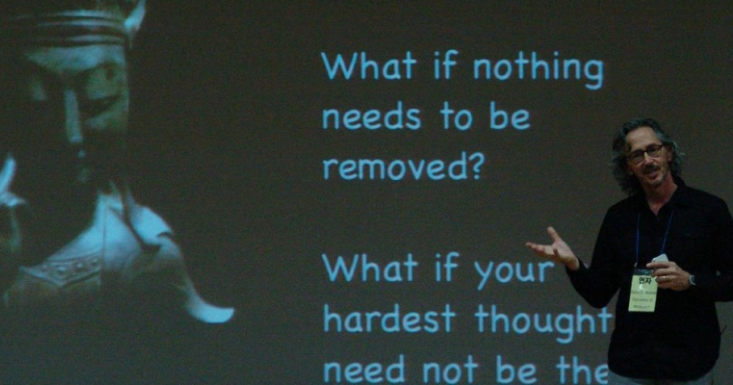By Kelly G. Wilson, PhD, Professor of Psychology at the University of Mississippi and Founder of Onelife Education and Training, LLC.
The word “defusion” is totally made up. You won’t find it in a dictionary. The word reflects the notion that you can literally “fuse” with a thought, the way two pieces of hot plastic might fuse together to become one object. Defusion describes a state in which we regard the contents of our thoughts as just what they are: a collection of words that form in our minds. Depending on how useful they are in our lives, we may act upon them, or we may not. But we get to choose. There’s an opposite state to defusion, which, because psychologists are a creative bunch, is known as fusion. Fusion describes a state in which we take our thoughts literally, investing them with consequence and authority. Fusion comes with a sense of urgency—a sense that something must be done. When you’re fused with a thought, your opportunities for action in areas related to that thought are always diminished. Fusion with the thought that you are boring and unlikable diminishes your opportunities in the area of socializing because, well, people must have better things to do than pal around with dull boors.
Fusion with the thought that you are lazy and stupid limits what’s possible for you at work—and so forth. It may sound totally strange, but from an ACT perspective, we’re not especially concerned with the contents of thoughts and whether those contents are accurate. Instead, we want to know how workable those thoughts are in your life. We won’t do much at all to test the accuracy of or to change your thoughts, but we’ll work damn hard to get them to be more workable in the context of your life.
We’re chiefly interested in whether there’s enough space between your thoughts and you to permit you to live in a rich and purposeful way.
Defusion isn’t the same thing as debunking your thoughts or figuring out where you’ve made mistakes in thinking. In fact, merely knowing that you’ve had an erroneous thought won’t do you much good at all. It’s entirely common for people who worry about their health to “know” that they actually have clean bills of health and for people who are ill at ease in gatherings to “know” that others tend to find them charming. Defusion isn’t the process of arguing with or disputing your thoughts at all. Rather, it’s the process of holding all of your thoughts lightly enough to be able to do what you need to do in your life.
And we do mean all of your thoughts, even the ones that happen to be true. Consider again the student in a college class who thinks, “I’m the only one in the room who doesn’t get this stuff, so I’ll just keep my mouth shut and avoid looking like an idiot.” What if this student really was the only one in the room struggling with the material? Would the truth of that thought justify her decision to sit quietly? Not if her intended goal was to learn the material being taught. She’s faced with a rather painful choice: to speak up and reveal her ignorance or stay silent and remain ignorant. As we’ve seen before, both paths come with a fair amount of discomfort, but only one gets the student closer to where she wants to be in life.
How to Defuse
All by itself, knowing isn’t especially valuable. We’ve made a case for not taking your thoughts too seriously, and maybe we’ve persuaded you to give it a try. So how do you do it?
See also: Three Ways to Introduce Defusion in Session
The answer to that question begins with one of the really cool things about the ACT model. Remember how we said that each of the processes is reflected in the others? That’s true, and there’s a very intimate relationship between defusion and contact with the present moment. If you’re tearing through life as fast as you can go, with your sights set on something, anything, out in the future, it’s very likely that your thoughts of the moment will exercise a lot of control over your actions. Slowing down, even a little, is a good way to start seeing when you’re acting automatically on some thought you’ve had. And the games in the last chapter are all good ways to learn how to slow down.
Has your car ever made a disconcerting noise while you were driving, only to run silent and tight as a drum when you took it to the mechanic? It’s hard for the mechanic to fix a noise that she can’t hear—but she’s a busy woman, with lots of cars to see to in a day. If she had the time to sit quietly with your car as it rolled down the road, she would eventually hear the sound and have some idea of how to make it stop. It’s kind of like that with your thoughts—only the hourly rate you pay to sit and pay attention to your thoughts is much lower than what your mechanic charges. The game “Inhale, Exhale, Repeat” from the last chapter is a good way to get started. You can play that game anytime you suspect you’re struggling with a fused thought. If it’s not obvious to you what the problem is, sit with it for a while. It’ll show up eventually. When it does, you’ll be ready. You can think of this as catching the thought in flight.
See Things Might Go Terribly Horribly Wrong, by Kelly G. Wilson, PhD, for games designed to help you get a feel for defusion.
Come Learn to Use Defusion With Your Clients at ACT BootCamp!
